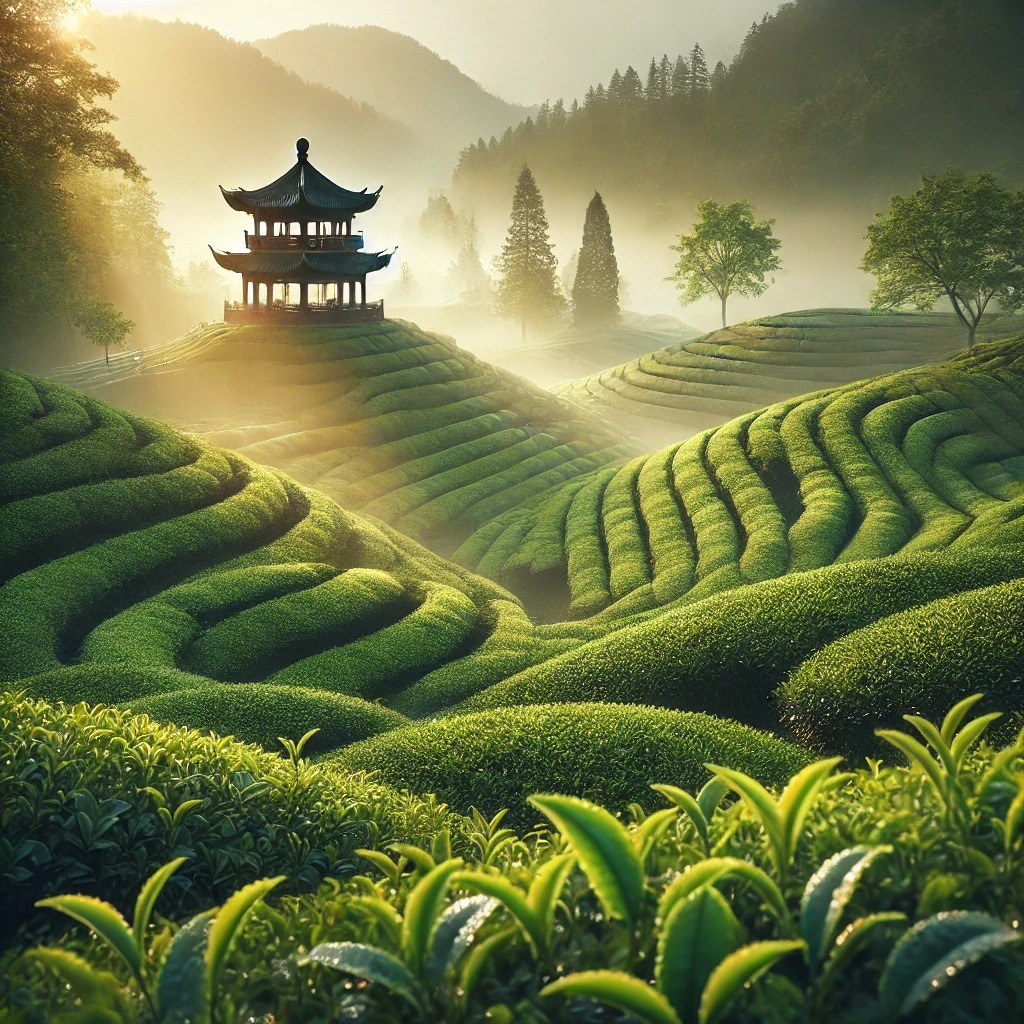
Introduction
China’s rich tea heritage boasts a myriad of flavours and styles, among which Xinyang Maojian and Mengding Ganlu stand out for their unique qualities and historical significance. These teas, coming from different regions of China, offer a glimpse into the diversity and refinement of Chinese tea culture.
Xinyang Maojian Tea: The Dew-Kissed Jewel of Henan
Xinyang Maojian, one of China’s ten famous teas, hails from Xinyang in Henan Province. This tea is cultivated in the mountainous regions of southern Henan, an area characterized by its cool climate and misty fog, which are ideal conditions for growing premium green tea. The name “Maojian” refers to the “hairy tips” of the tea leaves, which are a sign of high quality and careful processing.
Xinyang Maojian is celebrated for its fine, tender leaves, which are picked in the early spring when the buds are still young and full of vitality. The leaves are small and slightly curled with a rich green color, covered with fine white hairs. When brewed, Xinyang Maojian yields a light yellow-green liquor with a bright, clear appearance. Its flavour is crisp and refreshing, with a distinctive sweet aftertaste and a subtle hint of chestnut. The aroma is invigorating, with vegetal notes that evoke the freshness of spring.
Mengding Ganlu Tea: A Divine Elixir from the Misty Mount Meng
Mengding Ganlu, translating to “Meng Mountain Sweet Dew,” originates from the sacred Mount Meng in Sichuan Province. This area’s rich history of tea cultivation dates back over a thousand years, with Mengding Ganlu being one of the oldest known teas in China. The tea is grown at high altitudes, where the clouds and mist provide natural shading, slowing leaf growth and enhancing the tea’s flavour with increased amino acids and chlorophyll.
The leaves of Mengding Ganlu are carefully picked during early spring, specifically selecting only the young buds and the top one or two leaves. This meticulous selection process ensures a high-quality tea with a smooth and mellow taste. When infused, Mengding Ganlu produces a pale green or yellowish liquor, noted for its light body and silky texture. The flavour is subtle and refined, with a sweet and slightly floral aroma, and a clean, lingering finish that refreshes the palate.
Brewing Techniques
To fully appreciate Xinyang Maojian and Mengding Ganlu, proper brewing techniques are essential. For Xinyang Maojian, it is recommended to use water just off the boil (about 80-85°C) and steep the leaves for 1-2 minutes. This temperature brings out the tea’s vibrant flavours without extracting too much bitterness.
Mengding Ganlu also benefits from a gentle approach to brewing. Use water at a slightly lower temperature, around 75-80°C, and steep the leaves for about 1-3 minutes, depending on personal preference. This method preserves the tea’s delicate floral notes and natural sweetness, making for a soothing and enjoyable cup.
Cultural Significance
Both Xinyang Maojian and Mengding Ganlu are not just beverages but cultural symbols, each representing their region’s tea history and traditional craftsmanship. Xinyang Maojian is often enjoyed in everyday settings but is also a staple in ceremonies and special occasions across Henan and beyond, reflecting the community’s pride in their local tea.
Mengding Ganlu, on the other hand, has a storied past associated with spirituality and royal tribute. Historically, it was cultivated by monks and offered as a tribute to emperors, symbolizing purity and the harmony between nature and man. Today, it remains a prized tea, often given as a gift to honour guests and significant occasions.
Conclusion
Xinyang Maojian and Mengding Ganlu teas are exemplary of the sophistication and diversity of Chinese green teas. Each offers a unique taste experience that reflects the climate, soil, and tea culture of their respective regions. Whether savouring the crisp, refreshing notes of Xinyang Maojian or the delicate, sweet flavours of Mengding Ganlu, tea enthusiasts are invited to explore these rich, aromatic brews that connect them to centuries of Chinese tea tradition.







